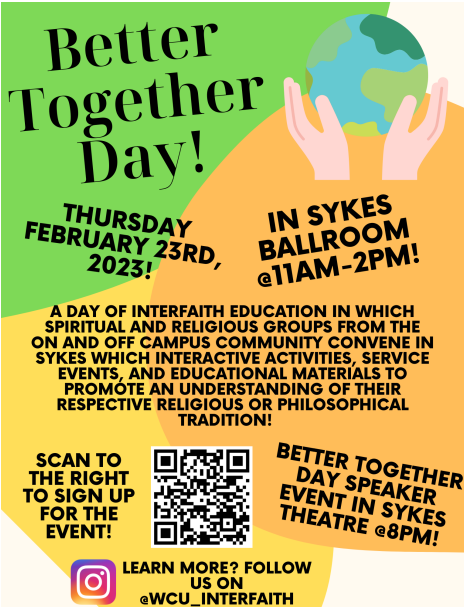Image via WCU Interfaith
The Interfaith Leadership Fellowship Program was created to “develop graduates to contribute to the common good, in part by helping students effectively participate in civic discourse and engage inclusively in a diverse society.”
The project is directed by Dr. Zachary C. Wooten, an Assistant Professor of Leadership Studies and Dr. Matthew Pierlott, an Associate Professor of Philosophy and Chair of the Philosophy Department with support from the Office for Diversity, Equity and Inclusion.
Their new project, “Interfaith, Meaning-Making and Spirituality Project” hopes to create a viable organization full of faculty, staff, students and community members who have an interest in the diverse religious and philosophical worldviews. Although there has been a variety of different religions all throughout campus, this new project has said, “to bring these efforts together collaboratively under an increasingly formalized structure to support, equip and celebrate interfaith leadership efforts.”
Ava Hough, one of the student members, described leadership within the organization. “Each member of the program has a different role to play, and the roles are not the classic jobs of president, vice president, secretary and treasurer; each fellow works within their own field of interest, incorporating interfaith into a passion that brings excitement but also benefits the program’s mission,” said Hough.
Rachel Shirk, a fellow member of the program, detailed the value in creating this campus organization. “Starting a program from scratch is daunting, but the reward of creating a space for interfaith work is worth all of the effort and risk,” said Shirk.
Over the past five years, Dr. Wooten taught a class titled, “Leadership and the Good Life,” which “focused on interfaith leadership, meaning-making and visions of “the good life.” As a result of this, the class was originally developed as part of a mini-extension grant in partnership with Yale University, who with “evidence of the class’ success,” received a grant from the “Interfaith Youth Core,” also known as “Interfaith America.” This funding helped to sustain student interest in the class, which began to be offered twice a year instead of once.
After taking the class, several student leaders were said to have, “maintained their new commitment to interfaith leadership.”
One former student, Alex Chura, a Philosophy major, developed a student-run committee, “the Interfaith Action Committee,” aiming to include representatives from various religious, philosophical and other organizations on campus to promote interfaith education, cultural competence and work for the common good.
“This project is really a blank canvas waiting to be painted,” stated Vu, another member of the group. “Since this is our first year being an active organization, open foundations were made along the way and open discussion of lessons. I see this project developing into a larger learning community that willbridge organizations on and off campus. Me and the other fellows come from different backgrounds and majors that attuned to our specialized focus areas.”
The Interfaith Action Committee has twice hosted, “Better Together Day,” a day bringing together campus and community organizations for a day of interfaith education and dialogue. They will host the event once again this February and will include a guest speaker, networking event, service project, and interactive display with partners from on and off campus.
Goal of the Interfaith, Meaning-Making, and Spirituality Project Building upon the successes of the Interfaith action committee and the Leadership and the Good Life class, this program aims to build a sustainable structure of support for efforts related to interfaith, meaning-making and spirituality through three primary initiatives:
- The Student Interfaith Action Committee
- (a co-curricular committee)
- Led by Junior History Major Joe Blaney
- The Faculty and Staff Interfaith Advisory Board
- The Interfaith Leadership Fellows
- (a paid campus peer educator program housed in partnership with philosophy)
“We have been operating under the umbrella of WCU’s Interfaith, Meaning-Making and Spirituality Project, so we are often working in conjunction with other organizations,” said Steven Kendikian, one of the other members. “For example, as we are preparing for our major interfaith connection event, “Better Together Day,” we are collaborating with the campus Student Interfaith Action Committee to expand how much we can do with the project. We hope to be perpetually working in partnership with religious and interfaith organizations to promote a healthier interfaith culture both on campus and in the greater West Chester community.”
Sean Wattman is a second-year Psychology major with a minor in Journalism. SW970700@wcupa.edu.

